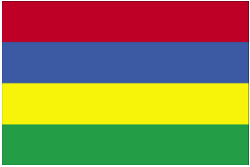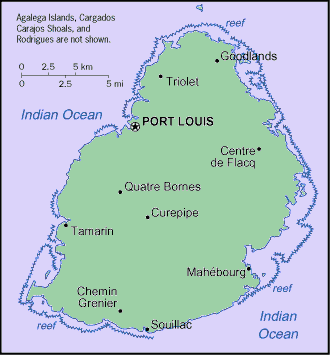Traveling Luck for Mauritius. Mauritius, Africa
Mauritius is located in Southern Africa, island in the Indian Ocean, east of Madagascar.
Land in Mauritius is small coastal plain rising to discontinuous mountains encircling central plateau.
Mauritian land covers an area of 2040 square kilometers which is almost 11 times the size of Washington, DC
 Mauritian national flag (Flag of Mauritius)
Mauritian national flag (Flag of Mauritius)
As for the Mauritian climate; tropical, modified by southeast trade winds; warm, dry winter (May to November); hot, wet, humid summer (November to May).
Mauritian(s) speak Creole 80.5%, Bhojpuri 12.1%, French 3.4%, English (official; spoken by less than 1% of the population), other 3.7%, unspecified 0.3% (2000 census).
Places of note in Mauritius
- Port Louis
- Curepipe
- Quatre Bornes
- Triolet
- Goodlands
- Centre de Flacq
- Bel Air
- Mahébourg
- Saint Pierre
- Le Hochet
- Baie du Tombeau
- Bambous
- Rose Belle
- Chemin Grenier
- Rivière du Rempart
- Grand Baie
- Plaine Magnien
- Pailles
- Surinam
- Lalmatie
- New Grove
- Rivière des Anguilles
- Terre Rouge
- Petit Raffray
- Moka
- Pamplemousses
- Montagne Blanche
- Grand Bois
- Long Mountain
- Plaine des Papayes
- Grande Pointe aux Piments
- Brisée Verdière
- Nouvelle France
- Grand Gaube
- Poste de Flacq
 Mauritian map
Mauritian map
Regions of Mauritius
Although known to Arab and Malay sailors as early as the 10th century, Mauritius was first explored by the Portuguese in 1505; it was subsequently held by the Dutch, French, and British before independence was attained in 1968. A stable democracy with regular free elections and a positive human rights record, the country has attracted considerable foreign investment and has earned one of Africa's highest per capita incomes. Recent poor weather and declining sugar prices have slowed economic growth, leading to some protests over standards of living in the Creole community.
Since independence in 1968, Mauritius has developed from a low-income, agriculturally based economy to a middle-income diversified economy with growing industrial, financial, and tourist sectors. For most of the period, annual growth has been in the order of 5% to 6%. This remarkable achievement has been reflected in more equitable income distribution, increased life expectancy, lowered infant mortality, and a much-improved infrastructure. Sugarcane is grown on about 90% of the cultivated land area and accounts for 25% of export earnings. The government's development strategy centers on expanding local financial institutions and building a domestic information telecommunications industry. Mauritius has attracted more than 9,000 offshore entities, many aimed at commerce in India and South Africa, and investment in the banking sector alone has reached over $1 billion. Mauritius, with its strong textile sector, has been well poised to take advantage of the Africa Growth and Opportunity Act (AGOA).
Mauritian natural resources include arable land, fish
the main island, from which the country derives its name, is of volcanic origin and is almost entirely surrounded by coral reefs
Mauritian religion is Hindu 48%, Roman Catholic 23.6%, other Christian 8.6%, Muslim 16.6%, other 2.5%, unspecified 0.3%, none 0.4% (2000 census).
Natural hazards in Mauritius include cyclones (November to April); almost completely surrounded by reefs that may pose maritime hazards.
Travel Advice for Mauritius
MauritiusSUMMARY
- Drug trafficking carries severe penalties.
- Although crime levels are low, you should be aware that thefts, assault and rape do occur.
- The threat from terrorism is low. But you should be aware of the global risk of indiscriminate terrorist attacks, which could be against civilian targets, including places frequented by foreigners.
- The Cyclone season in Mauritius is generally between November to May.
- Around 95,000 British tourists visited Mauritius every year. Most visits are trouble free. The main type of incident for which British nationals require consular assistance in Mauritius is petty theft of passports and other belongings. Other occurrences include water-sports and road traffic accidents.
- We strongly recommend that you obtain comprehensive travel and medical insurance before travelling. You should check any exclusions, and that your policy covers you for the activities you want to undertake. Please see: Travel Insurance.
SAFETY AND SECURITY
Crime levels are low in Mauritius, although incidents of theft, assault and rape are increasing. You should take sensible precautions against theft particularly in parts of downtown Port Louis and other tourist centres. There have been some attacks involving the use of weapons. Take care of bags and valuables when visiting popular tourist areas such as Grand Baie, Pereybere, Flic en Flac and Tamarin. Break-ins at self-catering accommodation can occur. Avoid renting accommodation from unregistered proprietors. All accommodation should be registered with the Ministry of Tourism. Only transact business with enterprises that have a permanent place of business, rather than street or beach vendors. Ensure that water-sport operators hold a valid permit issued by the Ministry of Tourism.
Report any incidents to the Police du Tourisme on the hotline number 213 2818 (available from anywhere on the island).
Take sensible precautions. Safeguard valuables and cash. Deposit them in hotel safes, where practical. Keep copies of important documents, including passports separately.
Political Situation
Mauritius Country Profile.
Relations with the UK are close, though demonstrations outside the British High Commission occur sporadically because of issues relating to the British Indian Ocean Territory.
Local Travel
You can drive on your UK driving licence, but you must have it with you at all times. The standard of driving here varies and there are frequent, though minor accidents (19,000 per year) so you should take special care when driving yourself. After dark, pedestrians and unlit two-wheeled vehicles can be a particular hazard.
Air Safety
The EU has published a list of air carriers that are subject to an operating ban or restrictions within the community. You should check the following link to see whether this will affect your travel: http://europa.eu.int/comm/transport/air/safety/flywell_en.htm
LOCAL LAWS AND CUSTOMS
ENTRY REQUIREMENTS
HEALTH
GENERAL

 Search
Search Mauritius country profile
Mauritius country profile Travel advice for Mauritius
Travel advice for Mauritius